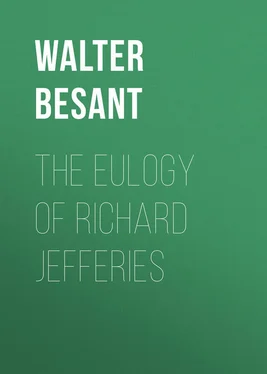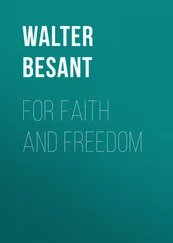Walter Besant - The Eulogy of Richard Jefferies
Здесь есть возможность читать онлайн «Walter Besant - The Eulogy of Richard Jefferies» — ознакомительный отрывок электронной книги совершенно бесплатно, а после прочтения отрывка купить полную версию. В некоторых случаях можно слушать аудио, скачать через торрент в формате fb2 и присутствует краткое содержание. Жанр: foreign_antique, foreign_prose, на английском языке. Описание произведения, (предисловие) а так же отзывы посетителей доступны на портале библиотеки ЛибКат.
- Название:The Eulogy of Richard Jefferies
- Автор:
- Жанр:
- Год:неизвестен
- ISBN:нет данных
- Рейтинг книги:5 / 5. Голосов: 1
-
Избранное:Добавить в избранное
- Отзывы:
-
Ваша оценка:
- 100
- 1
- 2
- 3
- 4
- 5
The Eulogy of Richard Jefferies: краткое содержание, описание и аннотация
Предлагаем к чтению аннотацию, описание, краткое содержание или предисловие (зависит от того, что написал сам автор книги «The Eulogy of Richard Jefferies»). Если вы не нашли необходимую информацию о книге — напишите в комментариях, мы постараемся отыскать её.
The Eulogy of Richard Jefferies — читать онлайн ознакомительный отрывок
Ниже представлен текст книги, разбитый по страницам. Система сохранения места последней прочитанной страницы, позволяет с удобством читать онлайн бесплатно книгу «The Eulogy of Richard Jefferies», без необходимости каждый раз заново искать на чём Вы остановились. Поставьте закладку, и сможете в любой момент перейти на страницу, на которой закончили чтение.
Интервал:
Закладка:
Walter Besant
The Eulogy of Richard Jefferies
PREFACE
In the body of this work I have sufficiently explained the reasons why I was entrusted with the task of writing this memoir of Richard Jefferies. I have only here to express my thanks, first to the publishers, who have given permission to quote from books by Jefferies issued by them, namely: Messrs. Cassell and Co., Messrs. Chapman and Hall, Messrs. Longman and Co., Messrs. Sampson Low and Co., Messrs. Smith and Elder, and Messrs. Tinsley Brothers, and next, to all those who have entrusted me with letters written by Jefferies, and have given permission to use them. These are: Mrs. Harrild, of Sydenham, Mr. Charles Longman, Mr. J.W. North, and Mr. C.P. Scott. I have also been provided with the note-books filled with Jefferies' notes made in the fields. These have enabled me to understand, and, I hope, to convey to others some understanding of, the writer's methods. I call this book the "Eulogy" of Richard Jefferies, because, in very truth, I can find nothing but admiration, pure and unalloyed, for that later work of his, on which will rest his fame and his abiding memory.
W.B.United University Club,
September, 1888.
CHAPTER I.
COATE FARM
"Go," said the Voice which dismisses the soul on its way to inhabit an earthly frame. "Go; thy lot shall be to speak of trees, from the cedar even unto the hyssop that springeth out of the wall; and of beasts also, and of fowls, and of fishes. All thy ways shall be ordered for thee, so that thou shalt learn to speak of these things as no man ever spoke before. Thou shalt rise into great honour among men. Many shall love to hear thy voice above all the voices of those who speak. This is a great gift. Thou shalt also enjoy the tender love of wife and children. Yet the things which men most desire – riches, rank, independence, ease, health, and long life – these are denied to thee. Thou shalt be always poor; thou shalt live in humble places; the goad of necessity shall continually prick thee to work when thou wouldst meditate; to write when thou wouldst walk forth to observe. Thou shalt never be able to sit down to rest; thou shalt be afflicted with grievous plaguy diseases; and thou shalt die when little more than half the allotted life of man is past. Go, therefore. Be happy with what is given, and lament not over what is denied."
Richard Jefferies – christened John Richard, but he was always called by his second name – was born on November 6, 1848, at the farmhouse of Coate – you may pronounce it, if you please, in Wiltshire fashion – Caute. The house stands on the road from Swindon to Marlborough, about two miles and a half from the former place. It has now lost its old picturesqueness, because the great heavy thatch which formerly served for roof has been removed and replaced by slates. I know not whether any gain in comfort has been achieved by this change, but the effect to outward view has been to reduce what was once a beautiful old house to meanness.
It consists of two rooms on the ground-floor, four on the first floor, and two large garrets in the roof, one of which, as we shall see, has memorable associations. The keeping-room of the family is remarkable for its large square window, built out so as to afford a delightful retreat for reading or working in the summer, or whenever it is not too cold to sit away from the fireplace. The other room, called, I believe, the best parlour, is larger, but it lacks the square window. In the days when the Jefferies family lived here it seems to have been used as a kind of store-room or lumber-room. At the back of the house is a kitchen belonging to a much older house; it is a low room built solidly of stone with timber rafters.
Beside the kitchen is a large modern room, which was used in Richard's childhood as a chapel of ease, in which service was read every Sunday for the hamlet of Coate.
Between the house and the road is a small flower-garden; at the side of the house is a vegetable-garden, with two or three fruit-trees, and beyond this an orchard. On the other side of the house are the farm buildings. There seems to be little traffic up and down the road, and the hamlet consists of nothing more than half a dozen labourers' cottages.
"I remember," writes one who knew him in boyhood, "every little detail of the house and grounds, even to the delicious scent of the musk underneath the old bay window" – it still springs up afresh every summer between the cobble stones – "the 'grind-stone' apple, the splendid egg-plum which drooped over the roof, the little Siberian crabs, the damsons – I could plant each spot with its own particular tree – the drooping willow, the swing, the quaint little arbour, the fuchsia-bushes, the hedge walks, the little arched gate leading into the road, the delightful scent under the limes, the little bench by the ha-ha looking towards Swindon and the setting sun. I am actually crying over these delicious memories of my childhood; if ever I loved a spot of this earth, it was Coate House. The scent of the sweet-briar takes me there in a moment; the walnut-trees you recollect, and the old wooden pump, where the villagers came for water; the hazel copse that my uncle planted; the gateway that led to the reservoir; the sitting-room, with its delightful square window; the porch, where the swallows used to build year after year; and the kitchen, with its wide hearth and dark window."
In "Amaryllis at the Fair" the scene is laid at Coate Farm. But, indeed, as we shall see, Coate was never absent from Jefferies' mind for long.
Coate is not, I believe, a large farm. It had, however, been in the possession of the family for many generations. Once – twice – it passed out of their hands, and was afterwards recovered. It was finally lost about twelve years ago. To belong to an old English yeoman stock is, perhaps, good enough ancestry for anyone, though not, certainly, "showy." Richard Jefferies was a veritable son of the soil: not descended from those who have nothing to show but long centuries of servitude, but with a long line behind him of independent farmers occupying their own land. Field and forest lore were therefore his by right of inheritance.
As for the country round about Coate, I suppose there is no district in the world that has been more minutely examined, explored, and described. Jefferies knew every inch of ground, every tree, every hedge. The land which lies in a circle of ten miles' radius, the centre of which is Coate Farm-house, belongs to the writings of Jefferies. He lived elsewhere, but mostly he wrote of Coate. The "Gamekeeper at Home," the "Amateur Poacher," "Wild Life in a Southern County," "Round about a Great Estate," "Hodge and his Masters," are all written of this small bit of Wiltshire. Nay, in "Wood Magic," in "Amaryllis at the Fair," in "Green Ferne Farm," and in "Bevis," we are still either at Coate Farm itself or on the hills around.
It is a country of downs. Two of them, within sight of the farmhouse, are covered with the grassy mounds and trenches of ancient forts or "castles." There are plantations here and there, and coppices, but the general aspect of the country is treeless; it is also a dry country. In winter there are water-courses which in summer are dry; yet it is not without brooks. Jefferies shows ("Wild Life in a Southern County," p. 29) that in ancient and prehistoric time the whole country must have been covered with forests, of which the most important survival is what is now called Ashbourne Chase. For one who loved solitude and wanderings among the hills, there could be hardly any part of England more delightful. Within a reasonable walk from Coate are Barbury Hill, Liddington Hill, and Ashbourne Chase; there are downs extending as far as Marlborough, over which a man may walk all day long and meet no one.
Читать дальшеИнтервал:
Закладка:
Похожие книги на «The Eulogy of Richard Jefferies»
Представляем Вашему вниманию похожие книги на «The Eulogy of Richard Jefferies» списком для выбора. Мы отобрали схожую по названию и смыслу литературу в надежде предоставить читателям больше вариантов отыскать новые, интересные, ещё непрочитанные произведения.
Обсуждение, отзывы о книге «The Eulogy of Richard Jefferies» и просто собственные мнения читателей. Оставьте ваши комментарии, напишите, что Вы думаете о произведении, его смысле или главных героях. Укажите что конкретно понравилось, а что нет, и почему Вы так считаете.












